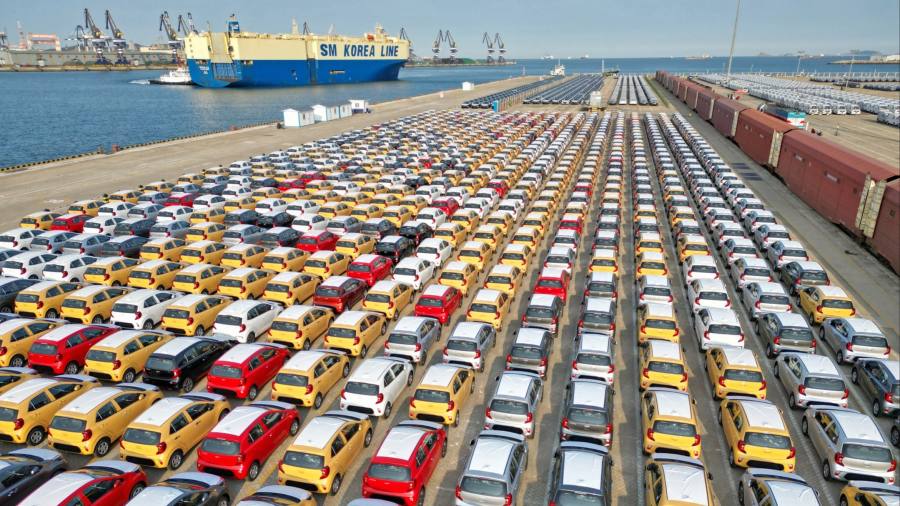Receive free updates on Automobiles. Sign up for our newsletter to get the latest news in the automobile industry delivered to your inbox every morning. China is poised to surpass Japan and become the world’s largest car exporter this year, marking a significant shift in the global car market. However, this achievement is overshadowed by deep structural issues within China’s domestic auto industry that could have far-reaching consequences for car markets worldwide.
The problem stems from a massive disparity between the production capacity of Chinese factories and the demand within the country. Industry executives have misjudged three crucial trends: the decline of internal combustion engine sales, the surging popularity of electric vehicles, and the decreasing need for privately-owned cars as shared mobility gains traction among China’s urbanized population. This has resulted in a staggering overcapacity of 25 million vehicles, according to industry expert Bill Russo.
Despite these challenges, China has made significant strides in boosting its competitiveness in the auto industry through supportive industrial policies and private sector investments. Domestic manufacturers like BYD have even surpassed foreign automakers in sales and are now targeting overseas markets for growth. Moody’s data shows that China’s annual vehicle exports have already surpassed those of South Korea and Germany, and are expected to exceed Japan’s this year.
However, the growth in exports comes at a time when sales volumes within China have reached their peak in 2017. The slowdown in China’s middle-class boom and broader economic weakness have contributed to this trend. Notably, the overcapacity issue impacts both local companies such as Chery, SAIC, BYD, Geely, and Changan, as well as foreign groups like Tesla, Ford, Nissan, and Hyundai, which have had to reposition their Chinese factories towards export markets.
Although consolidation was anticipated to address the overcapacity problem, it has not materialized yet. Financial support from Chinese governments and banks has kept unprofitable companies afloat, preventing necessary industry consolidation. Legacy automakers like Hyundai are experiencing difficulties in China, with low utilization rates and increasing losses. The Korean company now has two of its four factories in China up for sale.
Despite these challenges, China is expected to maintain its position as the world’s top car exporter for years to come. Consultancy AlixPartners forecasts that by the end of the decade, Chinese companies’ overseas car sales will reach 9 million, pushing their global market share to 30% in 2030, up from 16% in 2022. Chinese auto exports have mainly targeted developing markets in Europe and Asia, with Russia being a key destination in recent years.
As Chinese electric vehicles gain popularity, especially in Europe, analysts predict that the export wave will intensify. Tesla is already exporting electric cars from its Shanghai facility to Europe, and one-fifth of all EVs sold in Europe are manufactured in China. BYD, backed by Warren Buffett, is spearheading China’s EV exports into developed markets and has set an ambitious sales target of 400,000 units for next year.
Despite the potential for growth, companies exporting from China face challenges such as geopolitical tensions, limited brand recognition, rising protectionism, and increasing consumer nationalism. The rest of the world may not tolerate massive imports from China indefinitely, and Chinese companies could face pressure to relocate production overseas. It remains to be seen how the auto industry will navigate these obstacles in the coming years.
Denial of responsibility! Vigour Times is an automatic aggregator of Global media. In each content, the hyperlink to the primary source is specified. All trademarks belong to their rightful owners, and all materials to their authors. For any complaint, please reach us at – [email protected]. We will take necessary action within 24 hours.


